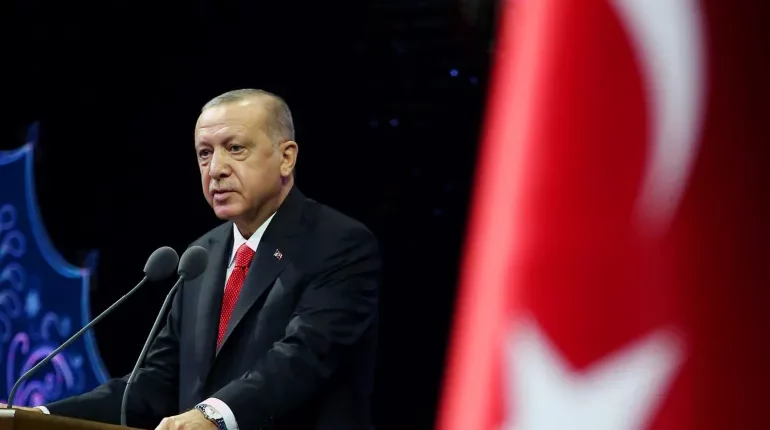Turkey’s fiercely contested presidential election appears likely to go to a second round after President Recep Tayyip Erdogan failed to secure 50% of votes cast to decisively extend his 20-year rule.
The high-stakes election will ultimately decide the fate of a key NATO ally and regional power broker at a time when Russia’s invasion of Ukraine has plunged much of the world into uncertainty.
The mood noticeably darkened at the headquarters of Erdogan’s Justice and Development Party (AK Party) in Istanbul on Sunday evening as his early lead slipped away.
With 97.95% of votes counted, the state-run Anadolu news agency reported Erdogan had 49.34% of votes, compared to 44.99% for his main opponent, Kemal Kilicdaroglu – meaning neither could claim an outright win.
The third candidate, Sinan Ogan, received 5.28% of votes, according to Anadolu, raising the possibility he could be a kingmaker in a runoff. He tweeted that a second vote is “quite possible,” and that “Turkish nationalists and Ataturkists are in a key position for this election.”
Kilicdaroglu welcomed the prospect of a runoff vote and said his party would triumph.
“If our nation says second round, we gladly accept it. We will absolutely win this election in the second round. Everyone will see that,” he said, of the runoff, slated for May 28.
Sunday’s race poses the biggest challenge yet to Turkey’s strongman leader Erdogan, who faced economic headwinds and criticism that the impact of the devastating February 6 earthquake.
For the first time, Turkey’s factious opposition coalesced around a single candidate, Kilicdaroglu, who represents an election coalition of six opposition parties.
Before the vote, analysts predicted that Erdogan would not give up power without a struggle – and that even if Kilicdaroglu managed to pull ahead, it was possible the numbers could be contested.
The outcome of the make-or-break vote is also being closely watched internationally, especially in Moscow and Europe.
Turkey, a NATO member that has the alliance’s second-largest army, has strengthened its ties with Russia in recent years. In 2019, it even bought weapons from the country in defiance of the US.
More recently Erdogan has raised eyebrows in the West by continuing to maintain close ties with Russia as it continues its Ukraine onslaught, and has caused a headache for NATO’s expansion plans by stalling the membership of Finland and Sweden.
Rivals both confident
Earlier in the count, Erdogan was confident he’d secure enough votes to win the election.
“We believe we will finish this round with over 50% of the votes,” he told supporters at the ruling Justice and Development (AK) Party headquarters in Ankara.
Kilicdaroglu earlier accused Erdogan’s AK Party of demanding recounts and delaying results in opposition strongholds, including in Ankara and Istanbul.
Speaking to CNN from a polling station in Istanbul’s Beyogly district, voter Korhan Futaci, 46, said: “My vote is for freedom. My vote is for the future of our kids. I’m hopeful.”
Yeliz Sahin, 46, whose brother and his son died in the earthquake, said: “It’s a historical moment that we’ve been waiting for for 20 years. This whole system needs to change.”
Meanwhile first-time voter Eren Uzmele, 19, said: “The future of the country is in our hands. It’s in the hands of the youth.”
Kilicdaroglu, a mild mannered 74-year-old former bureaucrat, has promised to fix Turkey’s faltering economy and restore democratic institutions compromised by a slide to authoritarianism during Erdogan’s tenure.
Leading candidates cast their vote
After casting his vote in Istanbul, Erdogan told reporters: “We pray to God for a better future for our country, our nation, and Turkish democracy.”
Meanwhile, after voting in Ankara, Kilicdaroglu said: “We all missed democracy, being together and embracing so much. Hopefully, from now on you will see spring will come to this country and it will always continue.”
Erdogan concluded his election campaign on Saturday night by praying at Hagia Sophia – a mosque and major historic site in Istanbul. In contrast, Kilicdaroglu visited the tomb of Mustafa Kemal Ataturk, the founder of modern Turkey and staunch secularist.
Erdogan has been extolling the virtues of his long rule, campaigning on a platform of stability, independent foreign policy and continuing to bolster Turkey’s defense industry. Recently, he raised the wages of government workers by 45% and lowered the retirement age.
Over the last two years, Turkey’s currency has plummeted and prices have ballooned, prompting a cost of living crisis that has chipped away at Erdogan’s conservative, working-class support base.
When a vicious earthquake on February 6 laid waste to large parts of southeast Turkey, Erdogan’s battled political aftershocks. His critics chastised him for a botched rescue effort and lax building controls that his ruling Justice and Development (AK) party presided over for two decades.
Source:cnn.com





